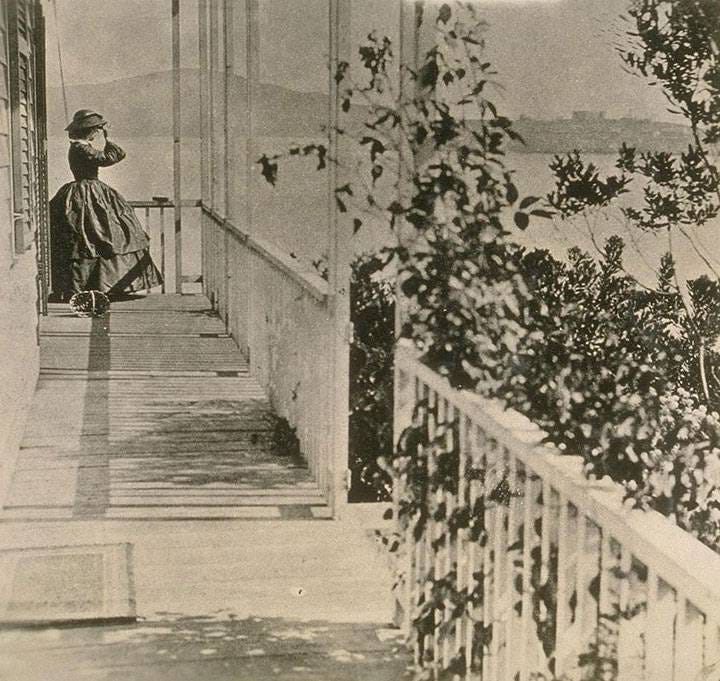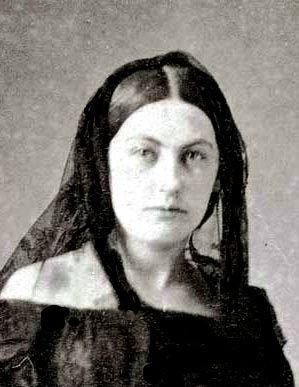California History After the Gold Rush: Chapter 19 —Jessie Benton Frémont, Bret Harte, Thomas Starr King
Before and during the Civil War, abolitionist Jessie Benton Frémont, celebrity wife of legendary Pathfinder and almost-President John C. Frémont, successfully mustered literary and clerical forces in San Francisco (including author Bret Harte and Reverend Thomas Starr King, who “saved California for the Union”) to oppose and defeat powerful Southern political forces as they sought to turn California into a slave state.
Read After the Gold Rush from the beginning:
Chapter 19:
Spring 1860: Black Point, California
Bret Harte, Jessie Frémont, Thomas Starr King
Jessie Fremont on the porch at Black Point
On the northerly shore of San Francisco Bay a line of bluffs terminated in a promontory, at whose base, formed by the crumbling debris of the cliff above, there was a narrow stretch of beach, salt meadow, and scrub oak. The abrupt wall of rock behind it seemed to isolate it as completely from the mainland as the sea before it separated it from the opposite shore. In spite of its contiguity to San Francisco—opposite also, but hidden by the sharp re-entering curve of coast—the locality was wild, uncultivated, and unfrequented.
White drifts of sea-gulls and pelican across the face of the cliff, gray clouds of sandpipers rising from the beach, the dripping flight of ducks over the salt meadows, and the occasional splash of a seal from the rocks, were the only signs of life that could be seen from the decks of passing ships.
It was a sparkling summer morning. The waves were running before the dry northwest trade winds with crystalline but colorless brilliancy. Sheltered by the high, northerly bluff, the house and its garden were exposed to the untempered heat of the cloudless sun refracted from the rocky wall behind it. Scrub oaks and manzanita bushes gave out the aroma of baking wood; occasionally a faint pot-pourri fragrance from the hot wild roses and beach grass was blown along the shore… all idealized and refined by the saline breath of the sea at the doors and windows.
Bret Harte, The Conspiracy of Mrs. Bunker
Read Bret Harte’s story from the beginning:
The Gothic cottage was one of five houses perched on this steep promontory overlooking the north coast, blanketed with the dark laurel shrubbery that gave Black Point its name. And Frank Harte could not but take it down in his mind in every detail, knowing that he would write about it, just as he was seeing it on this day.
He had escaped the torch-bearing mob that night in Humboldt, saved by the timely arrival of a sheriff. He’d immediately made good on his vow to quit the town for San Francisco, where he’d been hired as a typesetter at the prestigious literary journal, the Golden Era. Already he’d contributed a few pieces of his own for editor Joe Lawrence.
And now, not three months later, he had been summoned—there was no other word for it—here, to the legendary Black Point, by none other than Jessie Frémont.
The daughter of Senator Thomas Hart Benton. Wife, secretary and “other self” to John C. Frémont: Gold Rush millionaire, explorer, first Senator of California, first Republican candidate for President of the United States—so well-known for his antislavery position that Democrats had warned that his election would lead to civil war.
His wife had not merely played an active role in his candidacy—it had been known as the “Frémont and Jessie” campaign. She’d been hailed as the “First Lady of the Land,” and more disparagingly, “The better man of the two.”
And when the Frémonts were defeated at the polls by James Buchanan, abolitionist Lydia Marie Child mourned, “What a shame that women can’t vote! We’d carry our Jessie into the White House on our shoulders, wouldn’t we?”
What could this paragon possibly want with him?
Frank finally got up the courage to ring the bell, and a butler ushered him into a study.
He turned slowly in the center of the room, amazed. All around him the walls were covered by the maps drawn by the Pathfinder to the West.
He stepped forward to one, entranced, to trace the path of the famous California-Mormon Trail. He was so caught up in the imagining that she might have been standing behind him for some time. Then he became aware of a presence, and a light, sweet scent. He turned…
If there was a Queen of San Francisco, he was now standing before her. She was as beautiful as she was vivid, crackling with life force. Instantly the paralyzing shyness that had plagued Frank since childhood was on him again.
“Mr. Harte.” She came forward, extending a hand.
“M-Mrs. Frémont,” he heard himself stammer, and could not help gushing. “It is astonishing to see the maps in full. I’ve read your manuals, of course.”
It had been she who had captured the spirit of her husband’s adventures on the page, who had infused the entire nation with that dream of expansion.
“I fear I am one of what Hawthorne calls ‘that damned mob of scribbling women,’” she responded—and laughed at Harte’s obvious shock at her profanity.
She turned, taking in the maps, and he thought a shadow came over her face. “We had hoped to give the people a vision of what the country truly is, what it can be. I wonder how many people died because of what we wrote.”
Harte did not know what to say.
Then she smiled on him. The next words from her mouth were astonishing. “I have much enjoyed your recent writing in the Golden Era.”
“I am honored,” he managed.
“But there is another piece I am most interested in.” Her luminous face clouded again. “You wrote recently of the Wiyot massacre. I understand these butchers also threatened your life.”
For a moment he felt again the terror of it, and the lingering rage.
“The butchers have not suffered a day,” he said, his voice tight.
“Nor will they.” She walked the room in agitation. “These so-called ‘Indian Wars’… it is an extermination campaign. There is no other way to say it. And sanctioned by our own governor, our own legislature. An entire people is being obliterated, to serve our aspirations. I read what you write and I am ashamed of my own part in it.”
“Surely not so,” he protested.
“More than you know,” she said softly. But then she looked up, determined. “Your writing makes me want to do what I can to stop such injustice. That is the power words have.”
Harte felt as if he were in a stupor. Or a dream. No one had ever spoken to him in this way before. His own family had mocked him for his early attempts at poetry.
She touched his arm. “Walk with me. We’ll take the air. And there is someone I should like you to meet.”
He followed her into a glassed-in veranda encompassing three sides of the house, looking out over an astonishing panorama of the Golden Gate, Alcatraz Island, the Bay, and the hills and mountains beyond.
He stopped, mesmerized. It was like standing in the bow of a ship, with all of the world before him.
Mrs. Frémont’s eyes were shining. “You feel it too, this city.”
She waited as he opened the door for her and they passed down a set of steps out into the garden. The air was like a living thing, resonant with the sound of foghorns and the crashing of the surf, and the perpetual murmur of the trade winds.
Frank followed Mrs. Frémont onto a path leading across the garden to a small summerhouse, and she continued her thought. “But San Francisco can be overwhelming, at first. Have you found employment?”
“I have. As a typesetter at the Golden Era.”
She beamed at him. “In-house already? Splendid. Joe Lawrence will be a fine mentor for you.”
Harte colored. “I’m merely a compositor.”
“Not for long,” she said, with such confidence Harte felt some conspiracy afoot.
She stepped up to the porch of the summerhouse and knocked on the door.
It swung open to reveal a boy. No, on second glance, Harte discerned a frail young man, though barely as tall as Mrs. Frémont, with wide-set eyes and lank blond hair.
“Mrs. Frémont,” he beamed out at her.
“Good morning, Reverend. This is the young poet I’ve been pestering you about. Mr. Harte, Reverend Thomas Starr King.”
Harte knew the name. Only recently arrived from Boston, Starr King was already the City’s most famous preacher. On Sunday mornings, a thousand people and more crowded in to his church on Portsmouth Square to hear his sermons. Local newspapers often printed the text in full. Harte had read some, and marveled at the passion of them. The preacher’s faith, his patriotism and his politics seemed to combine in a seamless transcendent whole. Harte spoke slowly, determined not to stammer. “Reverend Starr King. I have read your speeches. I am in awe.”
The Reverend gave him a wink. “I had not known the thrill of public speaking until I stood in front of men armed with Bowie knives and revolvers.”
Harte could not stop studying the preacher. Gentleness radiated from him as light radiates from the sun. In the poise of his head there was nobility and power inexpressible; the serenity of one who had seen a vision, and to whom the vision had become a benediction. And yet his face was also lit with mischief.
“Beware, young Harte,” the Reverend warned. “Once Mrs. Frémont gets her hands on you there will be no rest.”
Her eyes sparkled. “It is true. I have plans for both of you. We have work to do together.”
The three of them returned through the garden to the veranda, where tea had been laid on a table. Mrs. Frémont poured, then spoke without preamble.
“The Southerners are working every day to create a slave state here. They shall not have it.”
Harte was startled by the sudden steel in her. She glanced at him. “I am blunt. Feminine courtesy and deference are the crutches the public expects a woman to use. But we have not time for that.”
She leaned forward, intent. “Southern states have threatened secession and Confederacy for forty years, indeed so often that many people in the country believe such a split will never come to pass. I am not among the sanguine. Ever since California was admitted to the Union as a free state there has been a growing movement among native Southerners here for California’s secession and union with the South, or the formation of a separate Republic welcoming the expansion of slavery.”
Harte had seen some of the rhetoric coming from Southern-leaning papers, and Reverend Starr King was nodding. “I have noticed. The Southerners out here are very down on me, because they say I am a strong anti-slavery man. They refuse to patronize my lectures on that ground, and say that I must not be countenanced.”
Mrs. Frémont’s face was pale and set. “With the nomination of Lincoln as our Republican candidate, secession is all but guaranteed. The fear of what may be in store for us, if this cloud of civil war takes shape, makes me restless.”
She stood, walked the porch. “You are both newly arrived in our City and can have no idea of the stranglehold Senator Gwin has over the politics of this state. I have known Dr. Gwin since the first California Constitutional Convention, before we were admitted to the Union. He was elected then along with my husband—and we have struggled against him ever since. He was a protégé of President Jackson and as a Tennessee aristocrat, he assimilated all Jackson’s prejudices—in particular, the supposed inferiority of all but the white race. He made his first fortune by political appointment as a tribal lawyer. He used his position to swindle the chiefs out of their own land.”
Frank’s face tightened with anger. Mrs. Frémont continued,
“From 1851 into our present Gwin has ruled the state. And since Mr. Frémont was senator, our only politician to stand against Gwin was Broderick. Now that Broderick has been slain by that infamous Judge Terry...” Harte heard a tremor in her voice, no doubt as she understood that her own husband might well have met the same fate.
She shook her head quickly, composing herself. “The majority of our state is against the expansion of slavery. But President Buchanan has mandated that Gwin is solely responsible for political appointments, and the senator has packed political offices, courts, the police force, with Southern sympathizers. One of his Southern judges has already dismissed all charges against Terry in the matter of Broderick’s murder.”
She looked from Harte to King. “This is the monolith that we face. But I have seen hearts and minds changed on the question. My own husband was raised in Charleston, the most pro-slavery city in the most pro-slavery state. His family were slaveholders. And yet he grew to see it as a monstrosity.”
Harte spoke impulsively. “In no small part due to your influence, I am sure.”
She answered sharply. “Due to the awakening of his conscience. Slavery is a madness, a poison veil its defenders cast over minds too young to comprehend or resist the horror. It puts human feelings, even human reason to sleep.”
Harte felt his own outrage rising. And in the same moment, inspiration. The fervent desire to fight the fight she was proposing, to right the wrong.
“We must awaken the conscience of our state,” she finished, looking from one man to the other.
“I agree. The danger of this influence is dire.” Starr King’s face was as animated as hers.. “The state must be Northernized thoroughly, by schools, Atlantic Monthlies, lectures…” He grinned. “New England preachers.”
“Yes…” Mrs. Frémont said slowly. “But we are not a Northern state. We are something altogether more. We must celebrate what is uniquely Californian. We must create a new culture of California. A fresh, free state in every sense, in hearts and minds. A state that will rise above Southern atrocities and Northern failures.”
Her eyes shone with determination. “We must loosen the diseased grip of the slave powers on the minds of Californians, and entice them to a new vision: a state of new, fresh, limitless possibilities.”
Harte caught a sudden glimpse of the dream, made manifest by the maps in the study, the adventurous spirit that had empowered every man, woman, and child who had made the perilous journey through the towering mountains and vast deserts, three thousand grueling miles past the former frontiers to the West.
Mrs. Frémont was speaking again. “We must work on two fronts. The literary and the political.” Her smile encompassed them both. “Now you may grasp my plan. Mr. Harte will help to mold a California literature, celebrating all things California, to release minds from the clutches of the old ways. The Reverend will present a political vision guided always by spiritual and moral purpose. As for me… you both are newly arrived in San Francisco. I have some small influence to open doors, arrange employment and speaking engagements to bring this dialogue to a wide public. Mr. Harte, I have sent word to Joe Lawrence. He shall be talking to you presently. And Reverend… I believe you will be needing a larger church.”
Harte stood paralyzed, overwhelmed, knowing he was entirely unworthy of the trust Mrs. Frémont seemed to be placing on him.
Before he could demur, the Reverend turned to him, as if reading his thoughts. “I must confess, I am terrified at the expectations Mrs. Frémont places on mere mortals.” His voice was kind. “But God—and Mrs. Frémont—never calls us to work we are not ready for.”
Harte nodded slowly.
“Then do I have your pledges?”
Jessie Frémont extended her hands, each to the other, and the men grasped her fine ones in theirs.
Read After the Gold Rush from the beginning:







Had absolutely no clue that California was in such a dangerously pivotal spot as secession and civil war loomed in the east.
"That is the power words have have.” <-- another typo?